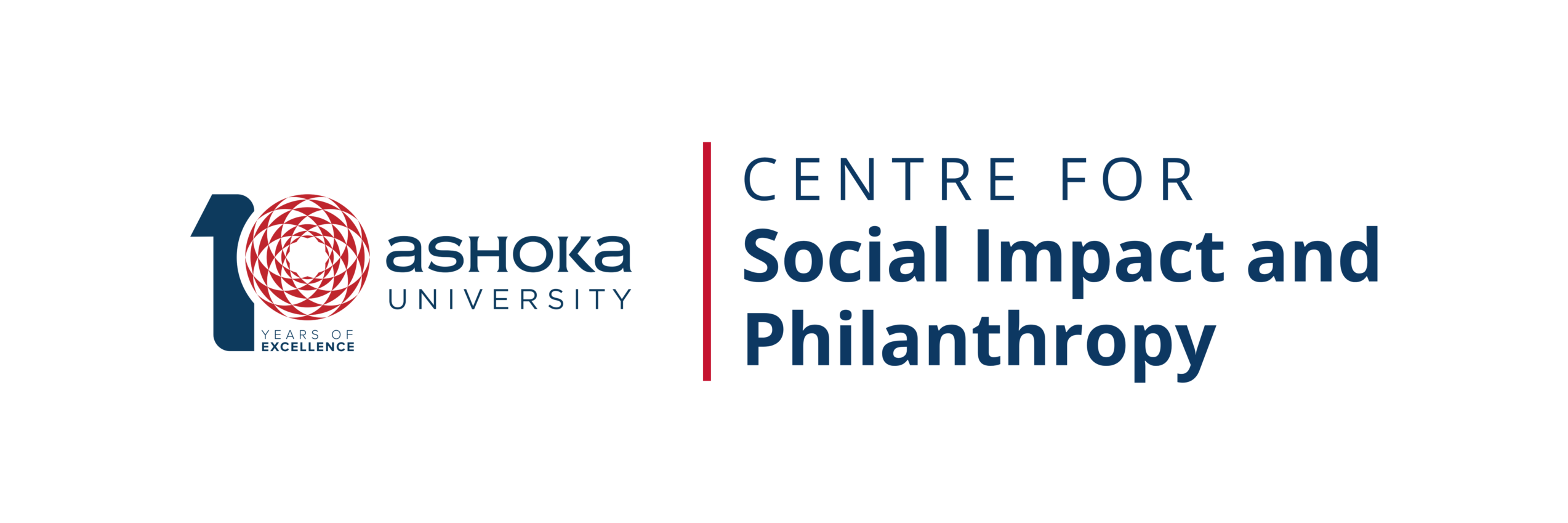Mapping Philanthropy, Generating Evidence: My Reflections from CSIP Fellowship
: By Mudasir Amin


 It was the first wave of the Covid-19 pandemic in India in 2020. Scenes of loss and despair were visible all around. Everything that one had previously taken for granted – especially our social lives – witnessed significant disruption. The abrupt transformation of everyday life pushed one to pause and reflect on imagined certainties and the arbitrariness of systems designed to protect and help. It was during this time of devastating impact on especially vulnerable groups and communities that I came across the CSIP Fellowship. By this time, I was close to wrapping up my doctoral project and thinking with questions of political conflict and NGO interventions. Despite the futility one associated with one’s endeavours in a time of such human loss, the opportunity at CSIP presented itself as one where the despair of the moment could be channelised into making sense of philanthropic interventions and their radical possibilities. One that was to become my anchor in those difficult times over the next many months!
It was the first wave of the Covid-19 pandemic in India in 2020. Scenes of loss and despair were visible all around. Everything that one had previously taken for granted – especially our social lives – witnessed significant disruption. The abrupt transformation of everyday life pushed one to pause and reflect on imagined certainties and the arbitrariness of systems designed to protect and help. It was during this time of devastating impact on especially vulnerable groups and communities that I came across the CSIP Fellowship. By this time, I was close to wrapping up my doctoral project and thinking with questions of political conflict and NGO interventions. Despite the futility one associated with one’s endeavours in a time of such human loss, the opportunity at CSIP presented itself as one where the despair of the moment could be channelised into making sense of philanthropic interventions and their radical possibilities. One that was to become my anchor in those difficult times over the next many months!
CSIP fellowship is a pioneering and timely attempt to map the field of philanthropy in India. The idea is to generate evidence and literature by supporting and creating a pool of interdisciplinary scholars who come up with innovative and novel ideas to study and scrutinise the sector through different lenses. The fellowship has played a vital role in pushing me to streamline and narrow down my research focus in philanthropic studies.
I believe my current interest in philanthropy follows a trajectory and is influenced by many factors. I have been involved in the study of NGOs ever since I took up social work in my Masters programme. This choice itself was shaped by the lived experiences of growing up in a conflict zone where one witnesses small-scale philanthropic interventions in crisis situations on a regular basis. During my Masters, however, when I got the opportunity of being placed with different philanthropic organisations to understand their governance and interventions, the work was so uncritically designed that the end products would most often ‘celebrate’ them as ‘blameless agents of benevolence’*. I subsequently set out to study the role of NGOs and civil society organisations in Kashmir with respect to the ongoing conflict trying to figure out where the NGO-conflict dynamic could be located and how they shape and transform each other. It was during this exploration that I came across different intersectionalities of how religion, philanthropy, and politics inform and interact with each other. Towards the end of my doctoral project and the outset of the Covid pandemic, I was thinking through my engagement with the sacred-secular clusters of philanthropic organisations. This was when the CSIP fellowship was announced, and I could safely visualise and place my questions and quandaries in their conceptual note. This is how this thread of my research took shape as a more focussed project to study faith-based organisations (FBOs) in the realm of Muslim philanthropy.
After selecting a diverse set of fellows with a range of interesting research questions, CSIP not just invested financially but also organised regular workshops and trainings to equip us with better skills and for contributing rigorous knowledge products in the field. At the same time, the amount of freedom the Centre offered us to pursue our research interests and think through these questions from the vantage point of our own lived experiences and research fields stands out. This was supplemented by continuous mentoring internally at the Centre as well as helping us connect with external mentors from more specialised fields.
Our cohort was initially onboarded by Lina, who took a keen interest in every single project and engaged with the proposals and helped us rework them. There were collective meetings as well as individual ones for us to discuss our progress and tensions in the work, with the CSIP team sharing inputs and listening to our concerns and anxieties with utmost care and professionalism. Given that ours was the inaugural cohort, we were always encouraged for feedback on the fellowship overall as well as on how the sessions and workshops were to be conducted. This made the endeavour an avenue for ‘co-creating’ a long-term initiative with the fellows. As Lina transitioned to a new role, Swati took over and ensured the completion of projects offering support and inputs amidst the pandemic disruptions that were with us for the entire duration of the fellowship and beyond. As if these disruptions were not enough, I faced a precarious ‘field disruption’ in my project, one that is not unexpected while conducting research in a place like Kashmir but nevertheless can derail the projects in unimaginable ways. The flexibility and support that the CSIP team, Swati, in particular – as the research director, offered helped me make adjustments in taking the project further without compromising the quality and ethics.
The entire fellowship was designed and conducted virtually as the pandemic limited any chances of in-person workshops as well as fieldwork. But the format of the workshops and monthly calls gave the cohort an opportunity to know each other and, more importantly, engage with the varied projects that were undertaken. For me, one important outcome of these interactive sessions was the identification and formation of a smaller group of four fellows as we figured out the overlaps in our research over time. Our projects looked into overarching themes of religious and indigenous forms of philanthropy in contemporary times across geographies and their tensions with the ‘secular’. My association with Malini, Rimi, and Zubin in this group has continued even post the fellowship as we share our work and views with each other. Many times, we have longed and hoped for in-person discussions and meetings as the virtual has brought in a kind of fatigue that makes things sound more mechanical than personal. I think I felt this strongly when Zubin and I bumped into each other at an airport in July 2022. It took us a while and a lot of initial hesitation to recognise each other. Imagine having had multiple conversations over e-meetings with someone and suddenly grappling with the tensions of the ‘virtual’ and the ‘real’! These tensions would also be palpable in navigating these works through a pandemic where people were dying for lack of oxygen.
As the second cohort of fellows is already working on exciting projects and as this research endeavour continues in the coming years, I see a lot of scope for refining the format and implementation of the fellowship for a pandemic-free world. As things are opening up and the future fellows have full access to the field, I am very hopeful that we would have more empirical evidence generation that informs the field of philanthropic studies for times to come. For this, my suggestion to CSIP would be consulting and considering the inputs from the current as well as previous fellows of how we see and envisage the fellowship in future for more effectiveness and impact.
For now, the fellowship projects are placing the Centre firmly as a leading place for rigorous mapping of different contours and nuances of the philanthropic sector. This is crucial to create an authentic empirical knowledge base with/from a non-western framework and setting, one that includes a significant part of the world population whose giving and philanthropic traditions are profound and come with a rich history. The Centre, and the fellowship in particular, are nicely shaping up to commission future projects that scrutinise the philanthropic sector and the interventions in careful and critical fashion to foster more accountability, especially in the context of the big philanthropy. The big philanthropy dominated by the corporate companies comes with what Rob Reich terms as ‘plutocratic exercise of power in a democratic society’** which deserves ‘scrutiny rather than gratitude’***. In a paradoxical situation, the community-based and localised organisations that work with people on ground, advocate for their rights, bring succour to millions and put in efforts for eradicating inequality, and struggle for social justice are more often funded by the big philanthropy. These are the kind of questions and paradoxes that this fellowship will hopefully address as we envision an age of ‘ethical philanthropy’. It is particularly important because, to quote Beth Breeze, “philanthropy is imperfect, messy and complex, but it is better than a world without philanthropy.”****
Mudasir Amin was a CSIP Research Fellow 2021
* I borrow this phrase from Dinyar Godrej’s piece ‘NGOs: Do they Help?’. see here; https://newint.org/features/2014/12/01/ngos-keynote. New Internationalist. 01 December 2014.
** Used directly from this book launch lecture by Rob Reich of his seminal book Just Giving: Why Philanthropy Is Failing Democracy and How It Can Do Better. For more on this debate watch here; https://www.youtube.com/watch?v=BpF_7uEXBCM. lse.ac.uk/events. 16 November 2018.
*** Ibid.,
**** Breeze, Beth. In defence of philanthropy. Newcastle on Tyne: Agenda Publishing, 2021.


